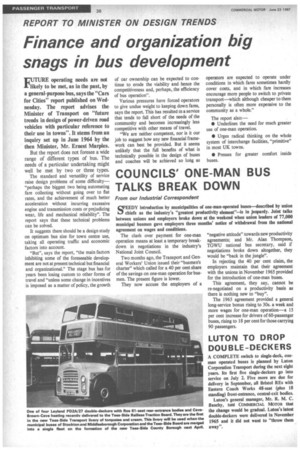Finance and organization big snags in bus development
Page 38

If you've noticed an error in this article please click here to report it so we can fix it.
rUTURE operating needs are not 1:likely to be met, as in the past, by a general-purpose bus, says the "Cars for Cities" report published on Wednesday. The report advises the Minister of Transport on "future trends in design of power-driven road vehicles with particular reference to their use in towns". It stems from an inquiry set up in June 1964 by the then Minister, Mr. Ernest Marples.
But the report does not foresee a wide range of different types of bus. The needs of a particular undertaking might well be met by two or three types.
The standard and versatility of service raise design problems of some difficulty— "perhaps the biggest two being automating fare collecting without going over to flat rates, and the achievement of much better acceleration without incurring excessive engine and transmission costs or prejudicing wear, life and mechanical reliability". The report says that these technical problems can be solved.
It suggests there should be a design study on optimum bus size for town centre use, taking all operating traffic and economic factors into account.
"But", says the report, "the main factors inhibiting some of the foreseeable development are not at present technical but financial and organizational." The stage bus has for years been losing custom to other forms of travel and "unless some change in incentives is imposed as a matter of policy, the growth of car ownership can be expected to continue to erode the viability and hence the competitiveness and, perhaps, the efficiency of bus operation".
Various pressures have forced operators to give undue weight to keeping down fares, says the report. This has resulted in a service that tends to fall short of the needs of the community and becomes increasingly less competitive with other means of travel.
"We are neither competent, nor is it our job to suggest how any new financial framework can best be provided. But it seems unlikely that the full benefits of what is technically possible in the design of buses and coaches will be achieved so long as operators are expected to operate under conditions in which fares sometimes hardly cover costs, and in which fare increases encourage more people to switch to private transport—which although cheaper to them personally is often more expensive to the community as a whole," The report also:— • Underlines the need for much greater use of one-man operation.
IP Urges radical thinking on the whole system of interchange facilities, "primitive" in most UK towns.
• Presses for greater comfort inside buses.












































































































